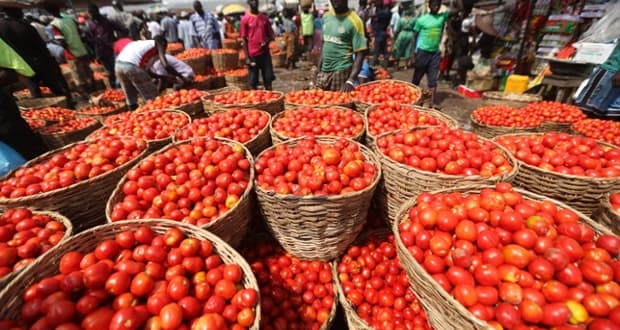The Tomatoes Growers and Processors Association of Nigeria has identified heightened demand during the Sallah celebration and a significant decline in production output as the primary drivers behind the recent spike in tomato prices across the country. According to the association, the festive period, which sees increased consumption for traditional dishes, has placed immense pressure on the already limited supply of tomatoes. This situation has been compounded by seasonal fluctuations in agricultural output, with farmers struggling to meet market needs due to environmental and logistical challenges.
The price of a large basket of tomatoes has surged dramatically, rising from a range of N55,000 to N60,000 to between N100,000 and N150,000 within a single month, as reported by the News Agency of Nigeria. This sharp increase has affected both wholesale and retail markets, with consumers in urban centers like Lagos, Abuja, and Kano feeling the pinch most acutely. The association notes that the Sallah period, a major Islamic festival, traditionally boosts demand for fresh produce, particularly tomatoes, which are a staple in many celebratory meals.
Low production output has been attributed to a combination of factors, including unpredictable weather patterns and inadequate irrigation systems in key tomato-producing regions such as Jos, Kano, and Kaduna. The rainy season, which often disrupts farming activities, has led to reduced yields, as many farmers rely on rain-fed agriculture rather than modern irrigation techniques. Additionally, the association highlighted challenges such as poor road networks and high transportation costs, which have made it difficult to move tomatoes from rural farms to urban markets efficiently.
The impact of these price hikes is being felt across the supply chain, from farmers to traders to consumers. Small-scale vendors, who form the backbone of Nigeria’s fresh produce markets, report shrinking profit margins as they struggle to afford stock at inflated wholesale prices. Households, particularly those with limited incomes, are being forced to adjust their budgets or reduce tomato consumption, which is a critical ingredient in Nigerian cuisine.
Efforts to address the crisis are underway, with the association calling for government intervention to support farmers through subsidies for fertilizers and irrigation equipment. They also advocate for improved storage facilities to reduce post-harvest losses, which are a significant issue during periods of low production. However, the association warns that without immediate action, the price surge could persist beyond the Sallah period, further straining food security in the region.




